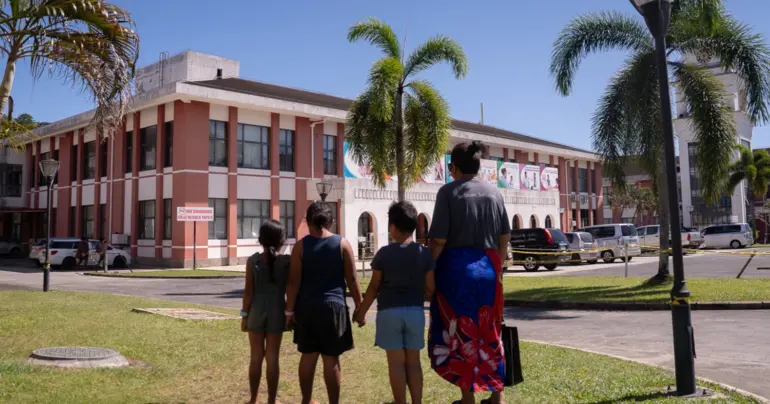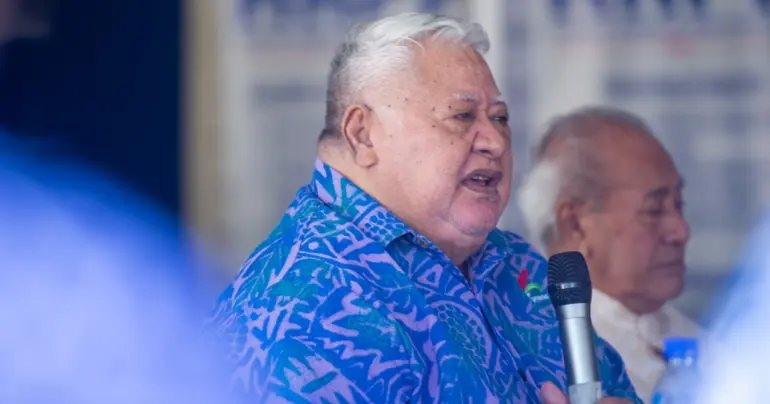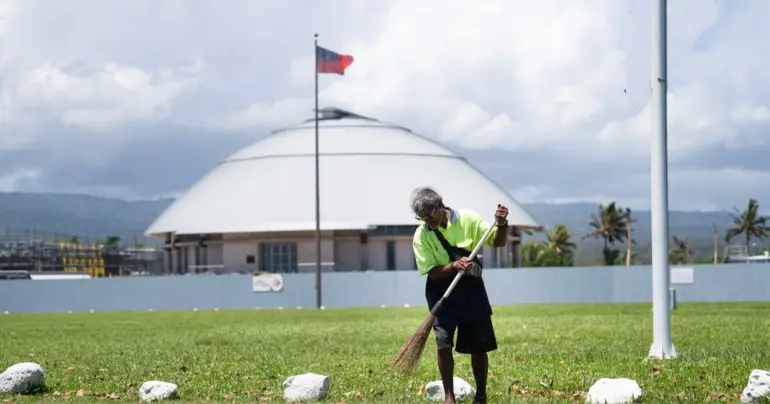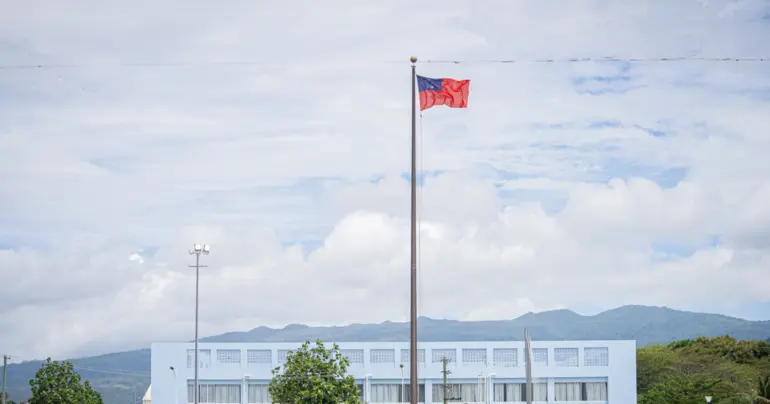The truth about the alienation of customary lands
Dear Editor,
Re: Customary lands, protests and democracy in a one-party state
Thank you for your editorial. Much has been said and debated about the controversial L.T.R.A. 2008 Legislation. But let me first quote our Constitution regarding Samoa lands that was written by our founding fathers.
The Constitution of The Independent State of Samoa 1960 Article 101. Land in Samoa -
(1) All land in Samoa is customary land, freehold land or public land.
(2) Customary land means land held from Samoa in accordance with Samoan custom and usage and with the law relating to Samoan custom and usage.
(3) Freehold land means land held from Samoa for an estate in fee simple.
(4) Public land means land vested in Samoa being land that is free from customary title and from any estate in fee simple.
The 1960 Constitution formally came into effect when Samoa gained independence from New Zealand on the 1 January 1962. During the struggle for independence our founding fathers foresaw a much needed mechanism to protect our future generations from the Colonial land-grabbing that has taken place all over the Pacific from the early 19th and well into the 20th century.
To further strengthen the Constitution Article 102 states -
No alienation of customary land - It shall not be lawful or competent for any person to make any alienation or disposition of customary land or of any interest in customary land, whether by way of sale, mortgage or otherwise howsoever, nor shall customary land or any interest therein be capable of being taken in execution or be assets for the payment of the debts of any person on his decease or insolvency: PROVIDED THAT an Act of Parliament may authorise:
(a) The granting of a lease or licence of any customary land or of any interest therein;
(b) The taking of any customary land or any interest therein for public purposes.
So it is clearly stated in the Constitution “No alienation of customary land or of any interest”. And that an Act of Parliament may authorise granting of lease or licence and the taking of customary land for public purposes under Alienation of Customary Land Act 1965. Yet the government went ahead with their reforms. But there was another safeguard that was put in place by our founding fathers and it is Article 109 of the Samoa Constitution.
109. Amendment of Constitution -
(1) Any of the provisions of this Constitution may be amended or repealed by Act, and new provisions may be inserted in this Constitution by Act, if a bill for any such purpose is supported at its third reading by the votes of not less than two-thirds of the total number of Members of Parliament (including vacancies) and if not fewer than 90 days elapse between the second and third readings of that bill:
PROVIDED THAT no bill amending, repealing or adding to the provisions of Article 102 or the provisions of this proviso shall be submitted to the Head of State for assent until it has been submitted to a poll of the electors on the rolls for the territorial constituencies established under the provisions of Article 44 and unless it has been supported by two-thirds of the valid votes cast in such a poll.
(2) A certificate under the hand of the Speaker that a bill has been passed under the provisions of clause (1) shall be conclusive and shall not be questioned in any Court.
Article 109 clearly states that no changes to the legislation regarding Article 102 is submitted to the HoS for assent until it has been submitted to a poll (referendum) of the electors (voters). Here is where the H.R.P.P. government did not adhere to the Constitution, went ahead and amended the legislation with L.T.R.A. 2008 without consulting the Samoan people. The H.R.P.P. government knew very well if the land reforms was put to a referendum it would not pass into law.
The H.R.P.P. government may believe freeing up customary lands is the key to economic growth for Samoa but thousands of our people are not convinced. There was never an issue under the old legislation, customary lands could be leased or licensed but not mortgaged. There are already businesses leasing under the Alienation of Customary Land Act 1965. An Act to provide for the leasing and licensing of customary land for certain purposes.
I suppose it comes down to loans needed to implement government projects and help the economy grow and to appease the financial institutions that would naturally need collateral. So a strategy was put in place to facilitate or rather find a solution to allow mortgaging of customary land lease.
To get things going the government had the Land Registration Act 1992/1993 repealed and replaced by L.T.R.A. 2008 under Section 94.
Most critics see the L.T.R.A. 2008 as a Trojan horse for adopting the Torrens title land registration system. And that the purpose of the L.T.R.A. is to establish ownership of interest in land by registration, that is the folio is conclusive evidence of title (L.T.R.A. Section 12) and the estate of the registered proprietor is paramount (L.T.R.A. Section 32).
This can only be interpreted as the person registered is the sole owner of land or interest in land. Smells like Torrens title system to me, lol. Critics point out the damage is caused by Section 32 of the L.T.R.A. 2008.
The Alienation of Customary Land Act 1965 recognizes that the family matai, can on behalf of the extended family offer to lease their customary land to an interested investor. However, if the land is registered in the matai’s name, the legal system recognizes all of the extended family as owners. So dealing with foreign investors requires the whole extended family recorded and their consent to any deals. This according to ADB Technical Assistance Report prolongs the approval process and discourage long-term land development.
“Independent State of Samoa: Promoting Economic Use of Customary Land, Phase III”.
A.D.B. provided further assistance to the Samoan government in establishing the CLAC through the Customary Land Advisory Commission Act, 2013. In setting up the Customary Land Leasing Section and amending the Alienation of Customary Land Act, 1965 to allow the mortgage of customary land leases.
C.L.A.C. was formed to advise the Cabinet on the facilitation, encouragement, and promotion of economic use of customary land and conduct public consultations on areas affecting customary land considered to be in need of reform. Also to review all laws affecting customary land in Samoa and make recommendations to the Cabinet for changes to such laws.
The Customary Land Leasing Section, which is housed within the Ministry of Natural Resources and Environment, now acts as the one-stop shop where landowners and investors can get information and advice on customary land.
The government has also ensured that a legal framework is in place to promote the economic use of customary land. While the use of customary land as mortgage is prohibited under Article 102 of the Constitution of Samoa, the H.R.P.P. government amended the legislation so that mortgage of customary land leasehold interest is now possible.
So basically your right or interest in customary land can be mortgaged and this right or interest can be resold if mortgagor defaults. You have given up your right or interest for 99 years and by the time it reverts back your descendants will not know or have forgotten about your family lands.
Well, let us look at the definition of what is freehold and leasehold.
Freehold is defined as permanent and absolute tenure of land or property with freedom to dispose of it at will or the outright ownership of property and land on which it stands.
Leasehold is defined as an ownership of a temporary right to hold land or property in which a lessee or a tenant holds rights of real property by some form of title from a lessor or landlord. Although a tenant does hold rights to real property, a leasehold estate is typically considered personal property. When the lease expires, ownership of the property reverts back to the freeholder or landlord.
Ok it is a bit confusing but we are trying to see how L.T.R.A. 2008 is seen by critics as a Torrens Title registration system.
L.T.R.A. 2008 Section 12. Manual folio to be considered evidence of title – A manual folio shall be:
(a) received by all Courts or persons having by law or consent of parties authority to hear, receive and examine evidence, as evidence of the particulars recorded in it; and
(b) conclusive evidence that a person recorded in the folio as the registered proprietor of an estate or interest in the land comprised in the folio is the registered proprietor of that estate or interest, – and that the land comprised in that folio has been duly brought under the provisions of this Act.
So subclause (b) is stating that a person recorded in the folio is the registered owner of an estate or interest in the land.
Torrens title is a system of land registration, in which a register of land holdings maintained by the state guarantees an indefeasible title to those included in the register (person registered as owner). Land ownership is transferred through registration of title instead of using deeds.
The impact of the Technical Assistance will be improved access to credit for business investment. This will be measured by credit to the private sector increasing from 43% of gross domestic product in 2012 to 50% in 2019 based on annual figures of the Central Bank of Samoa.
The outcome will be the use of customary land leases as collateral. The achievement will be reflected in commercial banks accepting customary land leases as collateral.
Well the bottom line is the ADB report sums up the intentions behind L.T.R.A. 2008 and the real reason as to why our land laws was amended. Simply to allow the mortgage of customary land leases.
Customary Land Advisory Commission (C.L.A.C.) will establish a legal working group (L.W.G.) to work closely with the Banking Association of Samoa to discuss further actions required to enable commercial banks to take advantage of this legal framework and accept customary land leases as collateral.
As a test case, an overseas investor has approached ANZ Bank (Samoa branch) to borrow money using as collateral the customary land lease they obtained from one of the villages (village unknown). CLAC and the LWG will work closely with the ANZ Bank, the overseas investor, and the government to broker this deal.
Some of the government sympathizers responded by asking why has no one ever taken the government to court to challenge LTRA 2008 legislation. Well guess what because all the lands registered under LRA 1992/1993 were automatically converted to the LTRA 2008 register without much fanfare and most people had no idea.
Section 14 was the first mechanism to bring lands under LTRA 2008 . When it came into effect, all lands registered in the Land Register under LRA 1992/1993 are deemed to be registered under LTRA 2008 as qualified title land.
The second mechanism was the registration of new transactions under Section 9 (1) of LTRA 2008.
No one is to blame for the confusion and objections to the LTRA 2008 except the HRPP government because there was no consultation with landowners or hold a public referendum as instructed by our constitution. There is a shroud of secrecy and denial about customary land leases and mortgages that we have our reservations. The people feel deceived and the mistrust of our politicians is at an all-time high.
I wanted to research and better understand the LTRA 2008 legislation but my understanding and interpretation is very similar to the Torrens title land registration system. So my personal opinion is that it is an unlawful piece of legislation that was fast tracked (by-passing the Constitution) and implemented to achieve the HRPP government’s agenda, which is to free up customary land for mortgaging.
I am not against the leasing of customary land but I am against registering one individual as owner and mortgaging of customary lands or interest in the land. This LTRA 2008 should be repealed!
The general public see politicians as dishonest, corrupt and self serving this has contributed to the lack of confidence in the government. They should be more open and transparent about issues that affect the tax payers whom voted them into government.
“Truth never damages a cause that is just” Mahatma Gandhi.
Soifua,
Oisole










